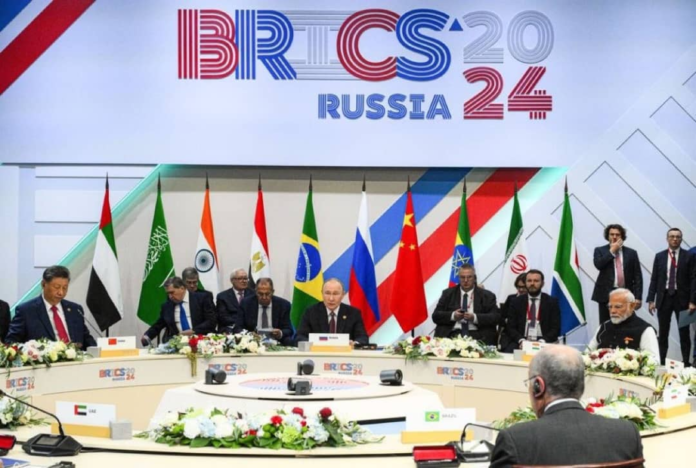In a historic move signalling its growing influence on the global stage, Nigeria has officially joined the BRICS group as its ninth partner country. The announcement, confirmed by the Brazilian government on January 17, 2025, marks a significant milestone in Nigeria’s pursuit of geopolitical and economic advancement within the global arena.
The Brazilian government, exercising its pro tempore presidency of the BRICS grouping, released a statement recognizing Nigeria’s formal entry into the BRICS partner category. “With the world’s sixth-largest population and Africa’s largest, Nigeria brings its considerable economic prowess and shared interests into the BRICS fold,” the statement noted. The West African powerhouse now joins Belarus, Bolivia, Cuba, Kazakhstan, Malaysia, Thailand, Uganda, and Uzbekistan in this newly established category of BRICS partner nations.
The decision to create a category for partner countries was first introduced at the BRICS Summit held in Kazan, Russia, in October 2024. During the summit, BRICS leaders deliberated on how to expand the group’s influence while strengthening ties with like-minded countries across the globe, particularly in the Global South.
Nigeria’s addition to BRICS signifies a deeper commitment to the bloc’s vision for expanding South-South cooperation and a strong advocacy for global governance reform. The Brazilian government emphasized that the country’s membership was more than just symbolic. It is a deliberate strategy to create a platform where emerging economies can push for changes in international institutions that better reflect the interests of the Global South.
“We are pleased to welcome Nigeria to the BRICS family,” said the Brazilian statement. “As one of the continent’s largest economies, Nigeria’s participation strengthens our mutual goals. From calling for reforms in the United Nations Security Council to addressing challenges like inequality and economic instability, Nigeria’s role will be pivotal in advancing these efforts.”
Nigerian officials expressed pride in the development, framing the move as crucial for the country’s continued integration into the global economic order. A statement from Nigeria’s Ministry of Foreign Affairs described BRICS as an organization whose values align with Nigeria’s aspirations for stronger intergovernmental cooperation, particularly in its efforts to diversify its economy and maintain growth despite external pressures.
With a population exceeding 200 million, Nigeria plays a central role in Africa’s political and economic landscape. Its active participation in international fora is critical to shaping the future of the continent. Additionally, Nigeria’s strategic location, vast natural resources, and robust political voice make it an influential player in global discussions, particularly in addressing regional challenges faced by emerging markets.
Experts see Nigeria’s official entrance into BRICS as not only a step toward boosting its trade relations with other emerging economies but also as a way to channel Africa’s collective bargaining power on the global stage. “This new status will help Nigeria navigate its role in global conversations on energy, climate change, trade, and foreign aid,” stated Olumide Adebayo, an international relations scholar at the University of Lagos.
The move also aligns with Nigeria’s broader strategic objective of diversifying trade and investment partnerships to reduce over-reliance on traditional markets like the United States and Europe. Joining BRICS provides Nigeria with an opportunity to build stronger relationships with key emerging economies such as China, Brazil, and India, where it can exchange knowledge, technical expertise, and innovative solutions in various sectors, including infrastructure, technology, and agriculture.
On the African continent, Nigeria’s entry into BRICS could set the stage for enhanced regional integration. Neighboring countries in the Economic Community of West African States (ECOWAS) are likely to benefit from Nigeria’s amplified status in international trade, especially in areas of investment and technology. Africa’s largest economy is expected to leverage BRICS membership to push for more impactful economic collaborations within the region.
Nigeria’s admission is viewed as a sign of the growing unity among developing countries, many of which have long lobbied for a bigger role in international forums that have historically been dominated by the West. The BRICS organization, which includes Brazil, Russia, India, China, and South Africa, represents over 40% of the world’s population and more than a quarter of global GDP. It is increasingly seen as an alternative to traditional Western-dominated bodies like the G7 and the International Monetary Fund (IMF).
This shift is especially significant because of the BRICS countries’ collective stance on the restructuring of institutions such as the United Nations. The demand for reforms to the Security Council is an ongoing point of contention, and Nigeria’s new role strengthens the push for more inclusive global governance.
It’s important to note that Nigeria’s partner status places it in a category somewhat distinct from full members like Brazil or China, a status that comes with different levels of engagement in BRICS processes. Nonetheless, Nigeria stands to benefit from increased diplomatic, trade, and investment ties with BRICS countries. With its large markets, diverse population, and growing technological prowess, Nigeria is poised to use its new status to enhance its economic footprint globally.
In the meantime, Nigeria is already solidifying its connections within BRICS, eyeing closer collaboration on matters such as technology transfer, digital innovation, and sustainable development. The group has already demonstrated the potential for African countries to collectively advocate for the continent’s priorities in forums like the World Trade Organization and the G20.
It is expected that Nigeria’s participation in BRICS will yield long-term benefits not only for the country but for the broader African continent. Many see the partnership as a step toward breaking the historical pattern of Africa being an afterthought in global economic conversations.

